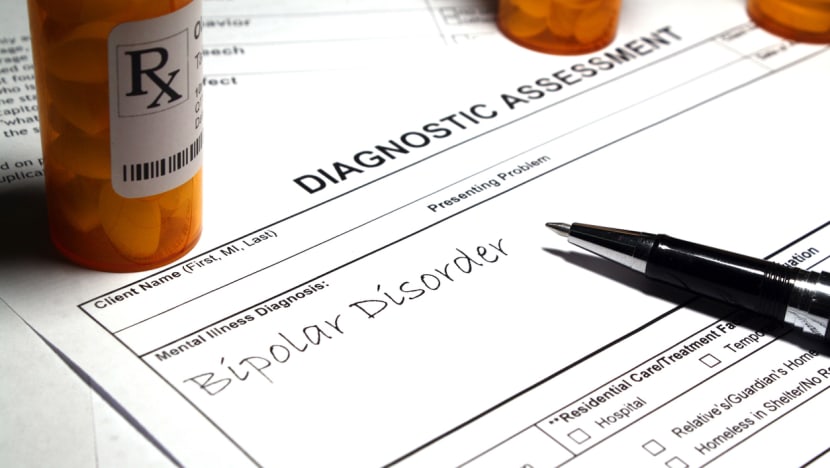Commentary: Saying ‘I’m so OCD’ when you’re not casts mental illnesses in a bad light
How often have you heard someone proclaim a family member has OCD when ranting about that person’s quirks? Psychiatrist Lim Boon Leng looks at why words matter.

File photo. Misusing mental health terms trivialises the difficulties and tribulations for people with or who had mental illnesses. (Photo: iStock/pcess609)
SINGAPORE: As a junior medical officer, one of my main duties was to scribe for senior doctors when they interviewed patients. In trying to keep up with their pace, we would often truncate long words. This included diagnoses. For example, instead of writing cerebrovascular accident, we would use acronyms such as CVA.
Likewise in my first psychiatric posting, other trainees and I would often replace schizophrenia with “Schiz” when writing notes. With time, using such abbreviations became habitual, resulting in us using these terms when we communicated the diagnosis verbally.
It was not long before this caught the attention and, unsurprisingly, incurred the ire of our senior psychiatrists in the hospital.
In that foregone era where medical audits were not the be-all and end-all, our seniors were upset with us for using short forms such as “Schiz”, either written or verbal, not because they were afraid that we would fail an audit, but because doing so was disrespectful.
We learnt that as mental health providers, we must respect the diseases we treat and, even more so, the patients who are labouring under the immense debilitation of these unfortunate illnesses.
Some shrugged off such terminology issues as unimportant and instead blamed the senior doctors for being "anal".
I, however, took to the reasoning and have since joined the ranks of greying psychiatrists. Having been trained to utilise psychiatric diagnoses in the strictest and most accurate manner, it is often extremely jarring to hear them used flippantly by the public.

“I’M SO OCD”
Let us take obsessive compulsive disorder (OCD) as an example. How often have you heard someone proclaim that they have OCD, or a family member or friend has it? Often what they are ranting about is that the person has somewhat of a relatively higher standard in being proper and clean.
In contrast, the patient who meets the clinical criteria for OCD gets stuck in the shower for many hours, desperately wanting to leave yet being unable to do so until their washing ritual is performed perfectly in the right sequence.
Studies have shown that derogatory terms and negative references to mental illnesses are commonly used in print, television and movies. Worryingly, even animations and cartoons have been found to portray mental illness in a negative light. Consequently, young children will be exposed to these negative terms growing up and believe it is linguistically appropriate to use them in such a manner.
Memes making fun of OCD are abundant on the Internet. In a comedy podcast I heard recently, the comedian repeatedly called tech employees “autistic”.
IT’S NOT FUNNY
Using mental health terms in these ways may seem innocuous at first glance; some may even argue that it is done merely for fun and humour.
But this can cast mental illnesses and those who live with it in a bad light. More seriously, the resulting shame and social stigmatisation associated with having a psychiatric diagnosis is likely one of the the main reasons why they refuse to seek help and treatment.
In the medical community, when a terminology becomes too stigmatised, we change the name to the diagnosis to protect those with the condition.
Historical terms for intellectual disability, such as “imbecile”, “moron”, and “feeble minded”, were initially diagnostic terminologies. They became so heavily misused that they were replaced with terms such as “mental dullness”, “mental disability”, and later “special needs” and “mental retardation”.
However, these terms likewise crept into casual usage and in time words like “retard” and “special needs” became an insult and no longer politically correct to use.
In the last two decades, the preferred term has been that of “intellectual disability”. One cannot help but wonder when the euphemistic cycle will once again necessitate another change in nomenclature.

COMMONLY MISUSED TERMS
Aside from OCD, another mental health term commonly tossed around is “bipolar”. It is often used casually to describe people who have mood swings, are ill-tempered or who simply like to change their minds a lot.
I often have worried – but otherwise healthy - patients consulting me, anxious over about having “bipolar” symptoms when, in reality, they were experiencing passing mood swings.
Actual sufferers of bipolar disorder don’t have the luxury of having passing mood swings. They have extreme mood states of either mania or depression that are sustained for a significant duration of many days to even months. The symptoms of mania or depression are often severely debilitating.
In a manic phase, the patient is unusually elated, has an inflated sense of self, may be more confrontational, and have impulsive acts like overspending. The person may send out irrational messages to friends and family.
When the manic phase subsides after several weeks, the patient regrets the impulsive actions, dives into severe low mood, and loses motivation. The person becomes withdrawn, not wanting to socialise and may have suicidal ideations.
Depression is another often misused word. Feeling moody after watching a sad movie is world’s apart from what a person who actually has depression experiences - an intense sense of despair, hopelessness, loss of interest in everything around them and feelings of being a burden.
Used as slangs, many of these terms may mean nothing more than normal quirks or personality traits in all of us. Yet this trivialises the difficulties and tribulations for people with or who had mental illnesses.
Casual usage of these terms and the consequent watered-down definition of what these illnesses really are can sometimes also lead to some people medicalising life issues - that is to believe and attribute personal problems and failures in life to medical and psychiatric conditions.
Some students, who are not doing as well in school as they may hope to, become adamant that they suffer from attention deficit disorder (ADD) as they match the casually posted description of the condition on online forums.
Blaming the condition is not useful and detracts them from learning what they may require most: To manage their expectations and stress.
ROMANTICISING MENTAL HEALTH CONDITIONS
On the extreme end of this side of the spectrum, some may even romanticise about having a mental health condition and jump onto the bandwagon of what essentially is a fad. When #PTSD started trending, many homemade TikTok videos of young folks having PTSD flooded the platform.
Several weeks later, it was #DID (dissociative identity disorder).
For patients who actually have such mental health conditions, the stigmatisation, trivialisation and careless use of psychiatric diagnoses in our society’s everyday communication signals a lack of empathy from the people around them. It suggests to them that their community neither understands their conditions nor their suffering.
As a mental healthcare provider, I do not feel that it is mine or the psychiatric community’s responsibility to decide or police what should be said or can be used. Who is to say that my choices of words do not encroach on or are offensive to other professionals?
After all, how words evolve and how slangs arise is a complex issue. Today, many archaic psychiatric terms continue to survive only because they have slipped into our daily lexicon.
“Anal stage” was a Freudian psychoanalytic term used to refer to the link between potty training and personality in adulthood, but we now use “anal” casually to describe rigid behaviours.
“Paranoia” is an obsolete name of the psychiatric diagnosis of delusional disorder but is today acceptable as a word describing mistrust and suspicion.
IGNORANCE, NOT MALICE
I am sure the incorrect and casual use of psychiatric diagnoses and terminologies simply reflects the ignorance of the users rather than any malice.
While society is more willing than ever to talk about mental health issues rather than just sweep it under the carpet, these conversations are in my opinion usually superficial. Media continues to only focus on the unusual and sensational.
We do not yet have a deeper appreciation of the symptoms, dysfunctions and treatment of these conditions. As we have successfully accomplished with medical conditions like diabetes in Singapore, more must be done to educate the public and to improve mental health literacy in the population, especially for common disorders like depression and anxiety disorders.
As individuals, we can strive to be more careful in choosing the terms we use, avoid problematic language, and in doing so do our part in not further stigmatising mental health conditions and diagnoses.
It is only right that we learn to respect the health conditions - physical or psychological - that may afflict our family, our friends and ourselves.
Dr Lim Boon Leng is a psychiatrist at the Gleneagles Medical Centre.























